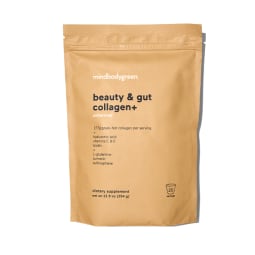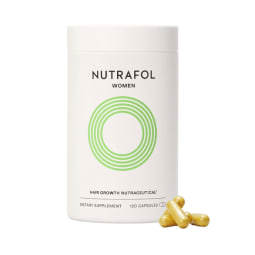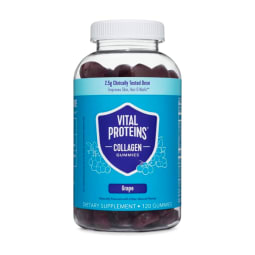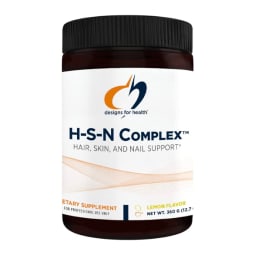Advertisement
The 5 Best Collagen Supplements For Hair Growth + Additional Hair Care Tips


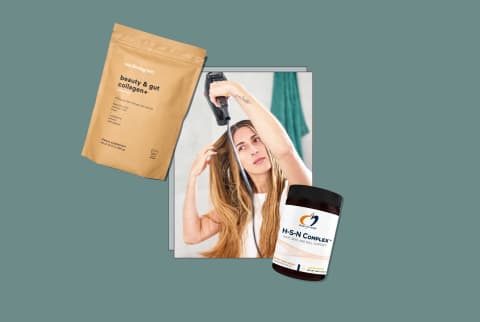
Hair growth (or lack thereof) is influenced by many things, including genetics, diet, stress, styling routines, hair care products, and overall health. So when hair growth becomes a concern, it can be challenging to pin down exactly what the root cause is and how to best support your hair.
This is why we recommend a holistic, all-encompassing approach to hair care—so you are supporting hair growth from all angles. This may include utilizing hair growth topicals, addressing lifestyle factors, addressing health matters with your practitioner, and, yes, even supplements.*
Hair growth supplements and vitamins have become quite popular lately, and one such ingredient that often comes up on the nutritional or supplement facts panel is collagen. Does ingesting collagen play a role in hair growth—and should you consider adding it to your routine? Well, we spoke to the experts and dove into the research about this hot topic and are here to share our findings.
Collagen and hair growth
First things first: Collagen does not make up hair.
Collagen is a protein found in the skin, gut, joints, and throughout the body to provide structure and strength. Hair, on the other hand, is predominantly made up of another protein, keratin. (Keratin is also found in your epidermis and nails.) Keratin is a protective protein that acts as a barrier. All proteins are made up of amino acids, often called "the building blocks" of proteins.
So why is collagen often marketed toward hair health? Well, supplements like collagen powder aren't actually the full collagen molecule (which would be too large to digest) but rather broken down and hydrolyzed collagen. In this form, it's actually absorbable amino acids!
Essentially: The amino acids in collagen supplements can be used by the body to produce other proteins, such as keratin.
Certified trichologist and founder of Advanced Trichology William Gaunitz, FWTS, told mbg that the primary amino acid that is most helpful is called proline1. Many collagen supplements are transparent about the amino acid profile within their formula, so you can even find options that contain this amino acid and are likely better suited for hair health.
But it's not just about the hair fiber itself, collagen can actually support the hair follicle and surrounding area. Rachel Maiman, M.D., board-certified dermatologist at Marmur Medical, notes that research has shown that collagen levels surrounding the hair follicle and bulb increase during the hair growth phase2 (otherwise called the anagen phase).* Then when they go into the maintenance and shedding phase, the collagen disappears.
So if the body can create more collagen, it may be able to support hair in the growth phase for longer. "As our bodies create more collagen, the layers regenerate. This supports our hair follicles by assisting them in reentering the anagen phase and maintaining the hair growth cycle," says Maiman.*
Indeed, we often talk about how you can't have healthy hair without a healthy scalp. "Collagen supports the scalp's thickness,"* Maiman says. "A thin scalp with insufficient collagen is less robust and less capable of holding the hair follicle bulbs in place."
Summary:
Best collagen supplements for hair growth
Pros
- Specialized complex that contains not only collagen, but 7 other nutrients, botanicals, and bioactives
- Supports strong hair and nails, glowing skin, and a healthy gut*
- Contains proline, glycine, lysine and arginine
- Comes in 2 flavor profiles
Cons
- Not vegan
Considerations:
Gluten-freeSoy-freeDairy-freeGMO-freeKeto friendlyMajor allergen-freeForm:
PowderThis collagen powder contains a robust assortment of nutrients that can support your overall beauty goals, hair included. The formula starts off with a base of 17.7 grams of collagen peptides, which include some of the most important amino acids for hair health like proline, glycine, lysine and arginine. The formula is rounded out with vitamin C and E (important for hair health in their own right), hyaluronic acid (benefits for scalp health), biotin, L-glutamine, turmeric and sulforaphane glucosinolate (for antioxidant support).*
Best marine collagen : Further Food Wild Caught Marine Collagen
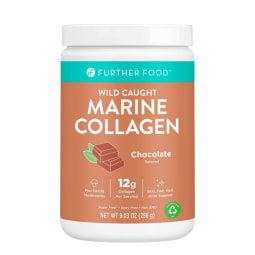
Pros
- Sustainably sourced from wild-caught North Atlantic codfish with Types 1, 2 & 3 collagen
- Contains proline, glycine, lysine and arginine
- 100% Post-Consumer Recycled jar
Cons
- This particular formula (which contains Reishi mushrooms) only comes in chocolate flavor profile, in case you want unflavored
Considerations:
Gluten-freeSoy-freeDairy-freeGMO-freeMajor allergen-freeForm:
PowderThis contains 12 grams of collagen sourced from fish, which makes it suitable for pescatarians. We always think sourcing is important with collagen peptides, and this collagen comes from wild-caught North Atlantic codfish. In addition to the collagen base, this contains mood-boosting organic reishi mushrooms—an important thing to highlight since day-to-day stress can influence hair growth.*
Advertisement
Pros
- Collagen is sustainably sourced from wild-caught North Atlantic fish
- Can also help improve lash and brow thickness*
- Contains several antioxidants, such as curcumin and resveratrol
Cons
- This is primarily a hair supplement, if you’re looking for a beauty supplement that addresses skin, nail, and overall health benefits.
Considerations:
Gluten-freeSoy-freeDairy-freeGMO-freeForm:
CapsuleThis formula targets a variety of mechanisms that can support hair growth, in the event you’re experiencing noticeable loss. The first way is through hormones: It contains saw palmetto, which can help reduce DHT in the body (a hormone that shrinks the hair follicle). Additionally it targets daily stress with calming adaptogens, neutralizes free radicals via antioxidants, and provides amino acid support with marine collagen and keratin.*
Pros
- Gummies are convenient and easy to ingest
- No artificial or synthetic flavors or colors
Cons
- Need to take 4 gummies per serving
- Does not disclose its amino acid profile
- Contains 5 grams of added sugar
Considerations:
Gluten-freeDairy-freeGMO-freeForm:
GummyWhile gummies aren’t typically the most potent supplement delivery method, if that’s the format you find easiest to take, then by all means. (Because with supplements, consistency is key.) A serving contains 2.5 grams of collagen peptides. While this may be at the low-end, it’s still a clinically-informed dosage that can support hair, skin, and nail health.
Advertisement
Pros
- Lemon flavor
- A robust assortment of nutrients that can support hair, skin, and nails*
Cons
- Expensive
- Does not disclose its amino acid profile
- Contains stevia extract, if you avoid that
Considerations:
Gluten-freeGMO-freeForm:
PowderWith a base of 5 grams of collagen, this powder is loaded with other hair and skin-loving nutrients. For example, vitamin C is a powerful antioxidant that supports collagen production, biotin is a B vitamin that supports hair health, aloe vera can hydrate skin, and silica can strengthen hair. But it doesn’t stop there, as it contains L-glutamine for gut health and glucosamine sulfate for antioxidant support.*
How we picked
Hair support
These collagen-led or collagen-containing formulas provide targeted support and building blocks for strong and healthy hair—from antioxidant protection and cellular energy production to providing amino acids used by our body to make keratin.*
Multi-ingredient
The supplements in our lineup include efficacious amounts of diverse active ingredients. These collagen peptides, vitamins, minerals, botanicals, amino acids, and other unique bioactives are science-backed for one or more aspects of hair health.*
Quality focus
We elevate brands that prioritize quality testing to ensure the potency and purity of the formula, from the starting materials to the finished products. We celebrate science-backed active ingredients and the exclusion of cheap additives.
Sustainability
We celebrate brands for which sustainability is top of mind. To that end, we enjoy shouting out green initiatives and certifications, as well as products that honor the environment through recyclable, eco-friendly packaging options, like glass.
Additional tips for hair growth
As we noted at the beginning of the article, a hair growth routine should be holistic. So here are some other steps and tips to try.
Other nutrients
Obviously, collagen and amino acids aren't the only nutrients to consider when supporting your beauty goals. For hair, there are several vitamins and nutrients to check out:
- Vitamin C. Not only does this help the hair and scalp deal with free radicals (thanks to its antioxidant properties), but it helps the body with other pathways. First, it's a vital part of the collagen synthesis process. And it "increases the absorption of iron, which is one of the most critical nutrients for your hair," says Gaunitz.*
- Vitamin E. Alongside its antioxidant properties, vitamin E can support circulation in the body, which is linked to healthy hair growth.*
- Vitamin D. Deficiencies of the sunshine vitamin have been linked to increased hair shedding3. This is because vitamin D supports the hair follicle itself, and without it the volume of hair fibers present on the scalp decreases. Almost all Americans are failing to consume just 400 IU of vitamin D from their daily diet, and clinical vitamin D insufficiency persists in almost half of the population.*
- Iron. This mineral is well understood to be one of the most critical for hair health4, as it improves circulation and carries oxygen and nutrients to the hair follicle. Iron-rich foods include beef, chicken, eggs, spinach, sweet potatoes, and beans. If you're concerned about your iron levels, consult a doctor for guidance before reaching for a supplement.*
Topicals & hair care tips
How you treat your hair with topical products will play a huge role in how your hair functions.
- Scalp care. Keeping the scalp healthy is the basis of hair growth. Be sure to keep the skin calm and hydrated and to regularly remove buildup. This means opting for a gentle shampoo a few times a week or doing regular deep cleans (with a clarifying shampoo) if you wash your hair less than weekly.
- Hair growth topicals. There is a growing number of hair growth topicals on the market that use clinically backed actives to support hair fullness. Look for serums or products that contain rosemary oil, castor oil, peptides, antioxidants, and aloe vera.
- Strengthening the hair fiber. Hair growth itself starts at the follicle, but it's equally important to strengthen the fiber in tandem. This is because increased growth won't mean much if the hair itself is regularly breaking or splitting. Use hydrating hair masks, protect it from heat damage, and style with care.
- Professional intervention. Sometimes you may need to visit a dermatologist or trichologist for more help. They can suggest additional routes for dramatic results.
Lifestyle
Hair is affected by what's happening in your life, so it's important to address any lifestyle factors that might be at play:
- Stress management. Stress affects hair growth, as demonstrated by research. It's important to have effective stress management techniques you can use when you feel overwhelmed.
- Address environmental stressors. Some environmental stressors, such as pollution or UV rays, are somewhat unavoidable. Just do your best to coat your hair with antioxidants to help address free radicals.
The takeaway
While hair isn't made up of collagen—keratin, rather—the amino acids found in collagen supplements can support your overall hair and scalp health. Plus, many collagen supplements contain other ingredients and vitamins that can promote hair growth. When starting your hair growth journey it's important to address the full scope of factors that influence hair—including diet, stress, lifestyle, and hair care. For more hair growth advice, check out our guide.
